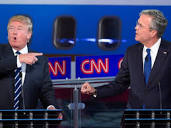 Sometimes the answer to who wins a debate lies in what sticks with you two days after the event. In the case of Tuesday’s CNN GOP Presidential debate out of Las Vegas, there were several sparks that still glow. After a bumbling start, in which Jeb Bush flubbed his opening remark (hasn’t he found a coach yet?), he got off what was perhaps the event’s most memorable utterance.
Sometimes the answer to who wins a debate lies in what sticks with you two days after the event. In the case of Tuesday’s CNN GOP Presidential debate out of Las Vegas, there were several sparks that still glow. After a bumbling start, in which Jeb Bush flubbed his opening remark (hasn’t he found a coach yet?), he got off what was perhaps the event’s most memorable utterance.
The only candidate to take on Donald Trump directly, Bush said Trump is great at one-liners, “but he is the chaos candidate, and he’d be a chaos President.” While Trump childishly made faces at Bush, Jeb also said to the Donald, “You’re not going to be able to insult your way to the Presidency.” Despite some truth in Trump’s rejoinder – that he was at 40 % in the polls while Bush was in single digits and thus had nothing to lose in going on the attack – Bush’s remarks were replayed in virtually all news coverage of the debate. Trump and Ted Cruz, however, appeared to play best with Republican voters.
Joan Vennochi’s column in today’s Boston Globe is an apt reminder that Jeb Bush said before getting into the race that only a candidate willing to lose in the primary could win in the general election. This is the biggest dilemma facing the Republicans if they ever want to return to the White House. Bush may never have a chance to test the notion, but at least he’s not cowering in these debates for fear of alienating the 60 percent of Republican primary voters who are not Trump supporters.
Chris Christie, who pledged to stand with King Hussein of Jordan (who died in 1999), also left no one doubting what his message is: he is the candidate who, as a former prosecutor, had, in the wake of 9/11, actually done something about terrorism. He repeatedly talked about how Obama (“feckless weakling”) and Hillary Clinton had made us less safe ignoring, as did the others, the complex diplomacy underway to try to bring about a ceasefire. This presumably would make us more safe. As the debate wore on, what was initially punchy rhetoric on Chrstie’s part soon became robotic, though GOP voters will doubtless remember his mock warning to Vladimir Putin that if the Russians violate a (recommended) no-fly zone over Syria, that Russian plane would be shot down.
This gave Rand Paul a set-up to tell the audience “If you want a President who will start World War III, you’ve got your candidate.” Throughout the event, Paul was a clear articulator of conservative/libertarian principles, urging minimal foreign engagement, caps on security data gathering. CNN was wise to include Paul.
A substantive discussion ensued, with candidates split on whether to go for regime change (Hussein, Qhaddafy, al Assad) or try to work with dictators, however evil they may be, to seek incremental change with stability. Our history abounds with vivid examples of roads taken and not taken, with mixed results.
Thanks to the debate’s focus on foreign policy and national security, candidates were also challenged on the specifics of how they’d deal with ISIS, with Ted Cruz repeating his commitment to carpet-bomb their enclaves until the desert glows in the dark. Putting aside his incendiary nuclear imagery, carpet-bombing hasn’t been done since Vietnam because of its ineffectiveness.
I wish that Lindsay Graham hadn’t been relegated to the kiddie debate earlier in the evening because his long experience in foreign policy might have shed more light on the debate between carpet bombing and precision strikes, which, by avoiding massive civilian casualties, were why Bush 41’s Desert Storm strategy was effective. Cruz, as is his debate style, dodged the question of whether he’d indiscriminately bomb civilians.
Trump, by the way, seemed clueless when adjunct questioner conservative Hugh Hewitt asked him which leg of the nuclear triad he preferred. It took Marco Rubio to remind the audience that the triad refers to missiles launched by air, land and sea.
The Republicans, as is everyone else, are divided on how to balance proactive security with invasion of privacy. John Kasich forcefully called for giving government the tools it needs, especially dealing with encryption.
A similarly vibrant debate centered on the security implications of different immigration policies. Rubio and Cruz, with superficially similar resumes and backgrounds, seemed to differ on the idea of a path to citizenship for certain illegals. Their voting records and public statements may leave less air between them than they, as Presidential candidates, would like voters to believe. It seems to me that Rubio is the more dangerous challenge to Clinton and the Democrats, while Cruz is more dangerous to the country and the world.
Because of the undemocratic craftiness of DNC Chair and Hillary acolyte Debbie Wasserman Schultz, the Democrats will hold their next debate on the Saturday night before Christmas week when almost no one will be watching.
I welcome your comments in the section below. To be alerted when a new blog is posted, click on “Follow’ in the lower right portion of your screen.